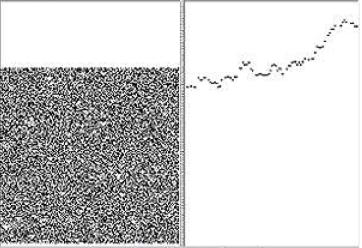|
Screenshots
|
Description
of Applet
|
|
![[ Squaring Rule Applet ]](http://sjsu.rudyrucker.com/images/square.jpg)
|
CA for Squaring
by Haile Eyob
The
java applet is based on the squaring rule. The 1DCA
generates the square of integer numbers. Each cell
uses only the 3 squares directly above it to determine
its color. There are 5 possible color for each cell.
For a given n black squares the block would produce a block
of n*n red squares.
|
|
![[ Search 1D CAs Applet ]](http://sjsu.rudyrucker.com/images/camorph.jpg)
|
Searching for 1D CAs
by Harry Fu
CAMorph is a 1-D CA Java Applet
Player that displays 9 CA views at once. It runs discrete
valued and
continuous valued CA with user intervention. For
discrete CA, there are 2 – 16 states between 1
– 3 radius. For continuous CA, it uses diffusion rule and wave
equation to generate variety of patterns. Please refer to
A New Kind of Science pages 55, 56, 155 – 168, 243
to experiment with
different CA rules.
|
|
![[ 1D CA Traffic Simulation Applet ]](http://sjsu.rudyrucker.com/images/traffic.gif)
|
1D CA Traffic Simulation by
Henry Jiang
I am making this
site in an attempt to model the traffic flow
using 1 D cellular automata. The model will follow
these rules taking from Dr. Ca Hortsmann's traffic
simulator applet, which follows the rules from
Kai Nagel and Michael Schreckenberg. The interface
at this point is near completion with minor decisions
to make and features to add. With some addition
features, the code will be extended to work with
the new features.
|
|
![[ Chaoticity of *3 Applet ]](http://sjsu.rudyrucker.com/images/3n.jpg)
|
Chaoticity of *3 by Tan Ma
The operations of elementary arithmetic are so simple. In here, patterns produced by starting with number 1, and then successively multiplying by factor of 3. In each case, the digit sequence of the number obtained at each step is shown in base 2. The result of mutiplication by 3 yields a much complicated pattern.
|
|
![[ 2D Turing Vants Applet ]](http://sjsu.rudyrucker.com/images/ant.gif)
|
2D
Turing Vants by Christine Meyer
Vants is a 2-D Turing Machine,
commonly called Langston's Ant which was developed
by Chris Langston. The original version moves
right when the background color is black, and
moves left when the background color is white.
The background color reverses color when the ant
moves to a new cell.
|
|
![[ Hexagonal CA Crystals Applet ]](http://sjsu.rudyrucker.com/~gauri.nadkarni/applet/snowpic.jpg)
|
Hexagonal
CA Crystals by Gauri Nadkarni
Hexagonal
CA crystals is a 2-D CA snowflake java applet.
This applet displays beautiful and intricate snowflake
patterns on a hexagonal grid. It is based on the
snowflakes described in NKS pp. 369-372. It displays
the seven-sum 3-state totalistic rules. The user
clicks on any grid cell to set the initial seed.
A set of rules are provided. The user can play
around with the rules by setting different seeds.
The applet also provides with a zoom facility
which resizes the hexagonal cells.
|
|

|
Financial
Market CA
by Baohoi Nguyen
This
is a Financial Market CA. It recreates
the randomness found in stock prices through
the randomness found in CAs. The X-axis
is time. The Y-axis value is determined
by the differences of black (sellers)
and white (buyers) cells.
|
|
![[ Reversible Cellular Automata Applet ]](http://sjsu.rudyrucker.com/images/reversibleCA.jpg)
|
Reversible 1D CA by
Kwanghyun Paek
Reversibility
is a universal characteristic of physical law,
and it is a precondition for the second law of
thermodynamics to hold. In Cellular Automata,
certain basic features of the physical laws, such
as uniformity and locality, are directly built
in. However, reversibility does not come automatically:
it has to be programmed in. Running a cellular
automaton backward is possible only when the cellular
automaton defined by the original rule is also
backward-deterministic. In special cases a system
can have the same rule for both direct and inverse
rules. By using the final state of the forward
run as an initial state for the backward run, the
system can rebuild the backward steps. The Reversible
1D CA Applet simulates the reversible 1D cellular
automata.
|
|
![[ CACont Java Applet ]](http://sjsu.rudyrucker.com/images/contlogo.jpg)
|
CACont
by Shruti Parihar
CACont is a java applet implementing
continuous valued Cellular
Automata. Different
rules like the Heat Rule, Wave Equation etc can
be tried on this applet.
|
![[ 2D Pattern Forming CA Applet ]](http://sjsu.rudyrucker.com/images/2dpattern.gif)
|
2D Pattern-Forming CA
by Rukman Senanayake
This applet demonstrates a 2D CA which can be used to generate patterns
found in biological systems, such as the stripes of a zebra or the pattern
on a mollusc shell. The main parameters are the weights which one can assign
to the neighboring cells. By adjusting these weights, as described by Wolfram
in NKS, a multitude of patterns can be seen.
|
|
![[ Sound Synthesizing 1D CA Applet ]](http://sjsu.rudyrucker.com/~karl.schramm/applet/casound.jpg)
|
Sound Synthesizing 1D CA by Karl
Schramm
CASound
is a 1D continuous cellular automata with a twist.
The twist being that it generates sound.
How does the synthesis work? During each generation
the values of the cells are used to create an
audio buffer. This buffer is then played much
like a typical audio file (e.g. .wav, .mp3, etc.).
Thus the sound you hear is an interpretation of
the values of cells themselves. So as the CA changes
and progresses, the sounds you hear do as well.
For more information on continuous 1D CAs, please
refer to pages 155-166 in Wolfram's book.
|
|
![[ 1D Turing Machine Applet ]](http://sjsu.rudyrucker.com/images/tm.jpg)
|
1-D
Turing Machine Applet by Min Yang
This
1-D Turing Machine applet uses time-space display
to show you the outputs of running the TM rules
clearly. You can choose rule from 2-state, 3-state,
4-state, 5-state Busy Beaver rules and other class
3, class 4 rules from Wolfram's book.
The cell is blank when its status is "0" and turns
to gray when its becomes "1". The clock hand stays
in the cell which tape head locates in. It also
represents the state number by turning
clockwise.
|